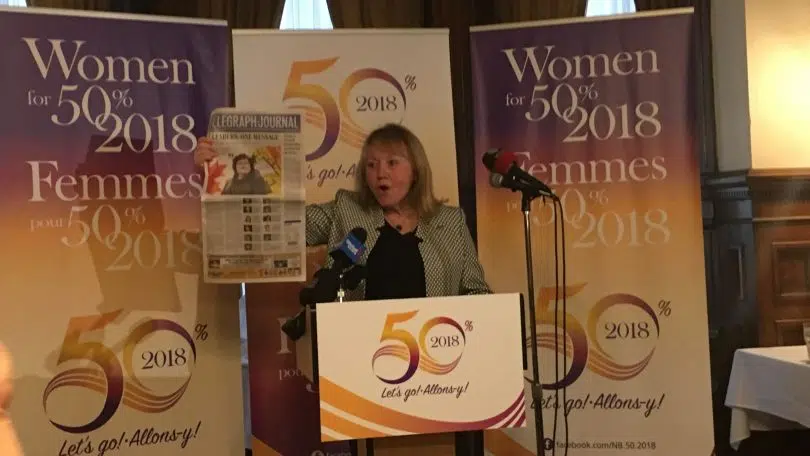
Roxanne Fairweather. Image: file photo.
A group seeking gender equality in the New Brunswick legislature is pleased with the results of this week’s election.
Women For 50% says a record 14 women were elected, including one-third of the governing Progressive Conservative MLAs.
Co-chair Roxanne Fairweather said that is an increase from 11 women in 2018 and eight women in 2014.
“There’s a lot of research that would tell us that for any minority group or any group that’s been disenfranchised, when you’re pushing toward equality, you need 30 per cent for that voice to be heard,” said Fairweather in a phone interview.
“I think we’re getting close with 28 per cent in the legislature with the 14 females and definitely the Conservatives with their majority have that percentage that women’s voices should be well heard.”
Fairweather said many of the parties she talked to had a hard time finding women to run for them, in part because of COVID-19 and the fact it was a snap election.
But she pointed to the Green Party of New Brunswick, whose candidate slate was made up of more than 50 per cent women.
“We see it can be done and that is the first step: getting women to step out and run,” said Fairweather.
“I’m really excited about the momentum we’re continuing to see, but that means we still have to keep a focus on it to make sure that we get to that point of 50 per cent.”
Political parties have an important role to play in cultivating opportunities for women in their party, said Fairweather.
That includes changing the culture, ensuring they’re intentional about their goal, and doing work to encourage women to run.
“I still go back to the art of the possible. If the Green Party can have 50 per cent, if the Progressive Conservatives can move so steadily forward in getting to parity within their slate of candidates and we’re seeing the results in the women that are elected … I think it’s just will and plan and make sure the foundation of your party within the ridings that you are promoting more women to step forward and take leadership roles.”
Fairweather said Women For 50% will be looking for the Progressive Conservative government to address economic recovery and the disproportionate impact the pandemic has had on women.
“We cite the RBC report where they’re actually coining it a ‘she-cession’ in terms of the recession that has followed the pandemic because women have been so significantly hit,” she said.
The RBC report also estimates the employment gains made by women since the 1980s have been nearly wiped out by the pandemic largely due to the lack of childcare, which the pandemic has revealed to be an economic issue.
The Organisation for Economic Co-Operation and Development (OECD)’s benchmark for childcare spending in developed countries is one per cent of the GDP, but the province currently only spends 0.4 per cent ($125 million) of its GDP on childcare.
“Women have to lead this initiative in terms of how the recession or the impact of COVID on the economy has impacted them. They have to lead the charge in terms of what the recovery plan is for us and I think a core component of that is childcare and eldercare,” said Fairweather.
With files from Elizabeth MacLeod.







